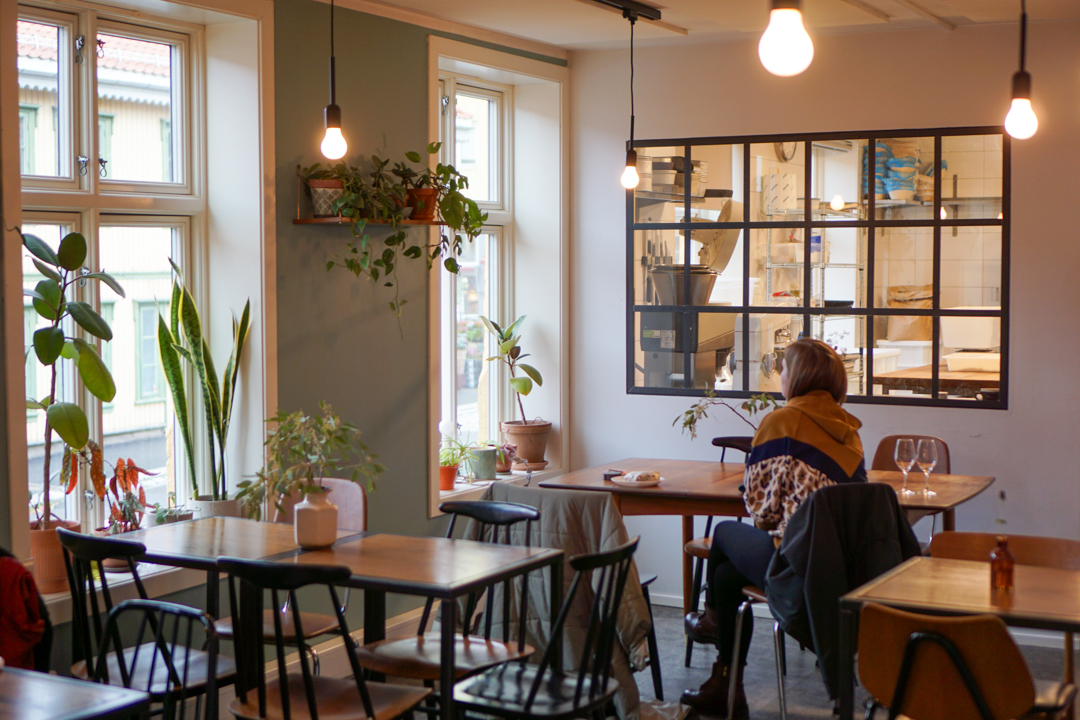When Farine (meaning “flour” in French) took over the yellow building at the heart of Eastern Oslo’s Kampen area, everything felt right. The building was originally built by a baker in 1878, where he produced bread in the basement while keeping his horses in the stable in the back. After a big fire accident in the area in 1879, the building was purchased by the Norwegian state. Today, it is included in the Kampen preservation zone by the city’s cultural heritage management office (Byantikvaren i Oslo).




The bakery opened its doors in January 2021 at the height of the Covid-19 pandemic. The two owners, Laura Raubaite and Andrea Marambio, both have long experience in the food and restaurant industry. Beating all the skepticism around the decision to open up a new shop while society was under lockdown, the bakery turned out to be a huge success, attracting people from all over the city to stand in a queue in the biting winter wind. The secret was their sourdough cardamom buns.
“In Copenhagen, cardamom buns were very popular. Then I decided we should also make them, and they are the only buns we were going to serve,” Marambio said in an interview in 2022 with Avisa Oslo, a local newspaper. According to the newspaper, Farine had a total revenue of 6.6 million NOK in 2021, with a profit right under 1 million NOK. The strong demand for their cardamom buns was one of the main contributing factors.
Back in 2021, the popularity of cardamom buns was on the rise. Farine’s success, to a certain degree, cemented the pastry’s status in Oslo’s cafés and bakeries. “I cannot take all the credits, it was our head baker Nikolaj Ernest Padevski who created our bestselling cardamom buns,” Marambio told local media in 2021. Padevski later moved on to work at Kumi Oslobukta and, at the time of writing, works as head baker at Håndbakt.
The bakery has since then become a popular café and brunch place. Once you walk inside, the first thing that catches your eyes are the exquisite, flower-patterned tiles on the floor. The slim black cast-iron tables with wooden tops lent an elegant touch to the space, forming a strong contrast with the steel ventilation pipe running along the wall.



On our latest visit, we tried both their cinnamon and cardamom buns, and both were very tasty, probably one of the best ones one can find in the core city area. In fact, their buns remain so popular that they can easily sell out by the middle of the day. In addition to the sourdough bread, sandwiches, cookies, banana bread and other pastries, the shop bakes different cakes during the weekend when more people come to visit.
If you are interested in specialty coffee, Farine serves coffee brewed with beans from the small, independent roastery Hibi Kaffe. Even though still in its early stages, the roastery is today the coffee provider to The Little Pickle, restaurant Panu, as well as Michelin 3-star restaurant Maaemo.

What better place to read a book about French gastronomy?
Behind the bakery stands the Kampen church. In front of the church is Thorbjørn Egners square, a small open space named after the famous Norwegian children’s book writer who used to live here. In one of his most famous books, he created the “Cardamom Town” (Kardemomme by), which has become the Norwegian ideal of a small, liberal neighbourhood full of polite, smiling and kind-hearted people.

All residents in Cardamom Town live by the one and only Law of Cardamom (Kardemommeloven), which clearly states: “You shall never bother others, you shall be both fair and kind, and whatever else you do I shall not mind (Man skal ikke plage andre, man skal være grei og snill, og for øvrig kan man gjøre hva man vil).” Sitting inside Farine, surrounded by the fragrance of coffee and fresh buns, looking out at the quiet, honey-coloured neighbourhood—for that one fleeting moment, you might feel that everything in life can actually be so simple and yet so true.
